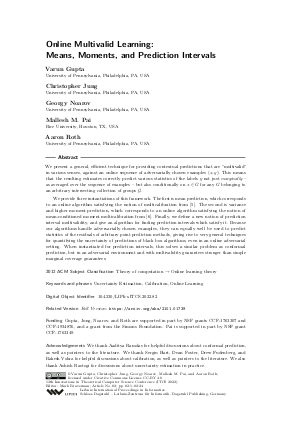Online Multivalid Learning: Means, Moments, and Prediction Intervals
Authors Varun Gupta, Christopher Jung, Georgy Noarov, Mallesh M. Pai, Aaron Roth
-
Part of:
Volume:
13th Innovations in Theoretical Computer Science Conference (ITCS 2022)
Part of: Series: Leibniz International Proceedings in Informatics (LIPIcs)
Part of: Conference: Innovations in Theoretical Computer Science Conference (ITCS) - License:
 Creative Commons Attribution 4.0 International license
Creative Commons Attribution 4.0 International license
- Publication Date: 2022-01-25
File

PDF
LIPIcs.ITCS.2022.82.pdf
- Filesize: 0.76 MB
- 24 pages
Document Identifiers
Related Versions
- Full Version https://arxiv.org/abs/2101.01739
Subject Classification
ACM Subject Classification
- Theory of computation → Online learning theory
Keywords
- Uncertainty Estimation
- Calibration
- Online Learning
Metrics
- Access Statistics
-
Total Accesses (updated on a weekly basis)
0PDF Downloads0Metadata Views
Abstract
We present a general, efficient technique for providing contextual predictions that are "multivalid" in various senses, against an online sequence of adversarially chosen examples (x,y). This means that the resulting estimates correctly predict various statistics of the labels y not just marginally - as averaged over the sequence of examples - but also conditionally on x ∈ G for any G belonging to an arbitrary intersecting collection of groups 𝒢. We provide three instantiations of this framework. The first is mean prediction, which corresponds to an online algorithm satisfying the notion of multicalibration from [Hébert-Johnson et al., 2018]. The second is variance and higher moment prediction, which corresponds to an online algorithm satisfying the notion of mean-conditioned moment multicalibration from [Jung et al., 2021]. Finally, we define a new notion of prediction interval multivalidity, and give an algorithm for finding prediction intervals which satisfy it. Because our algorithms handle adversarially chosen examples, they can equally well be used to predict statistics of the residuals of arbitrary point prediction methods, giving rise to very general techniques for quantifying the uncertainty of predictions of black box algorithms, even in an online adversarial setting. When instantiated for prediction intervals, this solves a similar problem as conformal prediction, but in an adversarial environment and with multivalidity guarantees stronger than simple marginal coverage guarantees.
Cite As Get BibTex
Varun Gupta, Christopher Jung, Georgy Noarov, Mallesh M. Pai, and Aaron Roth. Online Multivalid Learning: Means, Moments, and Prediction Intervals. In 13th Innovations in Theoretical Computer Science Conference (ITCS 2022). Leibniz International Proceedings in Informatics (LIPIcs), Volume 215, pp. 82:1-82:24, Schloss Dagstuhl – Leibniz-Zentrum für Informatik (2022)
https://doi.org/10.4230/LIPIcs.ITCS.2022.82
BibTex
@InProceedings{gupta_et_al:LIPIcs.ITCS.2022.82,
author = {Gupta, Varun and Jung, Christopher and Noarov, Georgy and Pai, Mallesh M. and Roth, Aaron},
title = {{Online Multivalid Learning: Means, Moments, and Prediction Intervals}},
booktitle = {13th Innovations in Theoretical Computer Science Conference (ITCS 2022)},
pages = {82:1--82:24},
series = {Leibniz International Proceedings in Informatics (LIPIcs)},
ISBN = {978-3-95977-217-4},
ISSN = {1868-8969},
year = {2022},
volume = {215},
editor = {Braverman, Mark},
publisher = {Schloss Dagstuhl -- Leibniz-Zentrum f{\"u}r Informatik},
address = {Dagstuhl, Germany},
URL = {https://drops.dagstuhl.de/entities/document/10.4230/LIPIcs.ITCS.2022.82},
URN = {urn:nbn:de:0030-drops-156785},
doi = {10.4230/LIPIcs.ITCS.2022.82},
annote = {Keywords: Uncertainty Estimation, Calibration, Online Learning}
}
Author Details
Funding
Gupta, Jung, Noarov, and Roth are supported in part by NSF grants CCF-1763307 and CCF-1934876, and a grant from the Simons Foundation. Pai is supported in part by NSF grant CCF-1763349.
Acknowledgements
We thank Aaditya Ramdas for helpful discussions about conformal prediction, as well as pointers to the literature. We thank Sergiu Hart, Dean Foster, Drew Fudenberg, and Rakesh Vohra for helpful discussions about calibration, as well as pointers to the literature. We also thank Ashish Rastogi for discussions about uncertainty estimation in practice.
References
-
A Philip Dawid. The well-calibrated bayesian. Journal of the American Statistical Association, 77(379):605-610, 1982.

-
Dean P Foster and Rakesh V Vohra. Asymptotic calibration. Biometrika, 85(2):379-390, 1998.

-
Drew Fudenberg and David K Levine. An easier way to calibrate. Games and economic behavior, 29(1-2):131-137, 1999.

- Sergiu Hart. Calibrated forecasts: The minimax proof, 2020. URL: http://www.ma.huji.ac.il/~hart/papers/calib-minmax.pdf.
-
Úrsula Hébert-Johnson, Michael Kim, Omer Reingold, and Guy Rothblum. Multicalibration: Calibration for the (computationally-identifiable) masses. In International Conference on Machine Learning, pages 1939-1948, 2018.

-
Christopher Jung, Changhwa Lee, Mallesh M Pai, Aaron Roth, and Rakesh Vohra. Moment multicalibration for uncertainty estimation. In Conference on Learning Theory. PMLR, 2021.

-
Jing Lei, Max G’Sell, Alessandro Rinaldo, Ryan J Tibshirani, and Larry Wasserman. Distribution-free predictive inference for regression. Journal of the American Statistical Association, 113(523):1094-1111, 2018.

-
Georgy Noarov, Mallesh Pai, and Aaron Roth. Online multiobjective minimax optimization and applications. arXiv preprint arXiv:2108.03837, 2021.

-
Alvaro Sandroni, Rann Smorodinsky, and Rakesh V Vohra. Calibration with many checking rules. Mathematics of operations Research, 28(1):141-153, 2003.

-
Glenn Shafer and Vladimir Vovk. A tutorial on conformal prediction. Journal of Machine Learning Research, 9(Mar):371-421, 2008.

